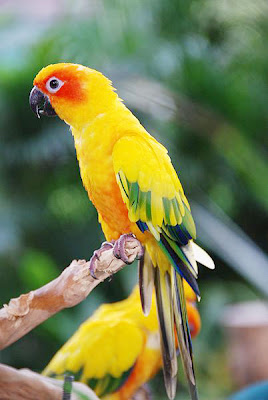The Life of Animals | Golden Parakeet | The Golden Parakeet or Conure Golden Guaruba guarouba, formerly classified as Aratinga guarouba is a species of neotropical parrot. It is a protected species listed on CITES appendix I The Golden Parakeet is Mainly yellow with green in the outer wings and with an all-yellow tail. It has a large horn-colored beak, pale-pink bare eye-rings, brown irises, and pink legs. Male and female have identical external appearance
Juveniles are duller and have less yellow and more green plumage than the adults. The juvenile's head and neck are Mostly green, the back is green and yellow, the upper side of tail is Mostly green, the breast is greenish, the eye-rings are pale-gray, and the legs are brown The Golden Parakeet is distributed in the northern parts of Brazil. The birds studied for a 1986 study used two different habitats During the year: During the non-breeding season, the which coincided with the dry season, They occupied the tall forest.
Golden Parakeets are a Sociable species, living, feeding, sleeping and even breeding together They eat fruits, flowers, buds, seeds, and cultured maize in the wild. The Golden Parakeet has a breeding system that is almost unique amongst parrots, ace pairs are aided by a number of helpers the which aid in the raising of the young This behavior is less common with parakeets in captivity, WHO Often Their young abandoned after three weeks
After the Golden Parakeet reaches sexual maturity at the age of three years, the breeding season starts in November and runs through February. They nest in a high tree, in deeper than average nesting cavities, and lay an average of four 37.1-by-29.9-millimeter (1:46 by 1:18 in) eggs, the which They aggressively guard. In captivity, breeding Golden Parakeets Will resume Pls Their chicks are taken from Them. At birth, the Golden Parakeets are covered in white down That eventually turns darker within a week.





No comments:
Post a Comment